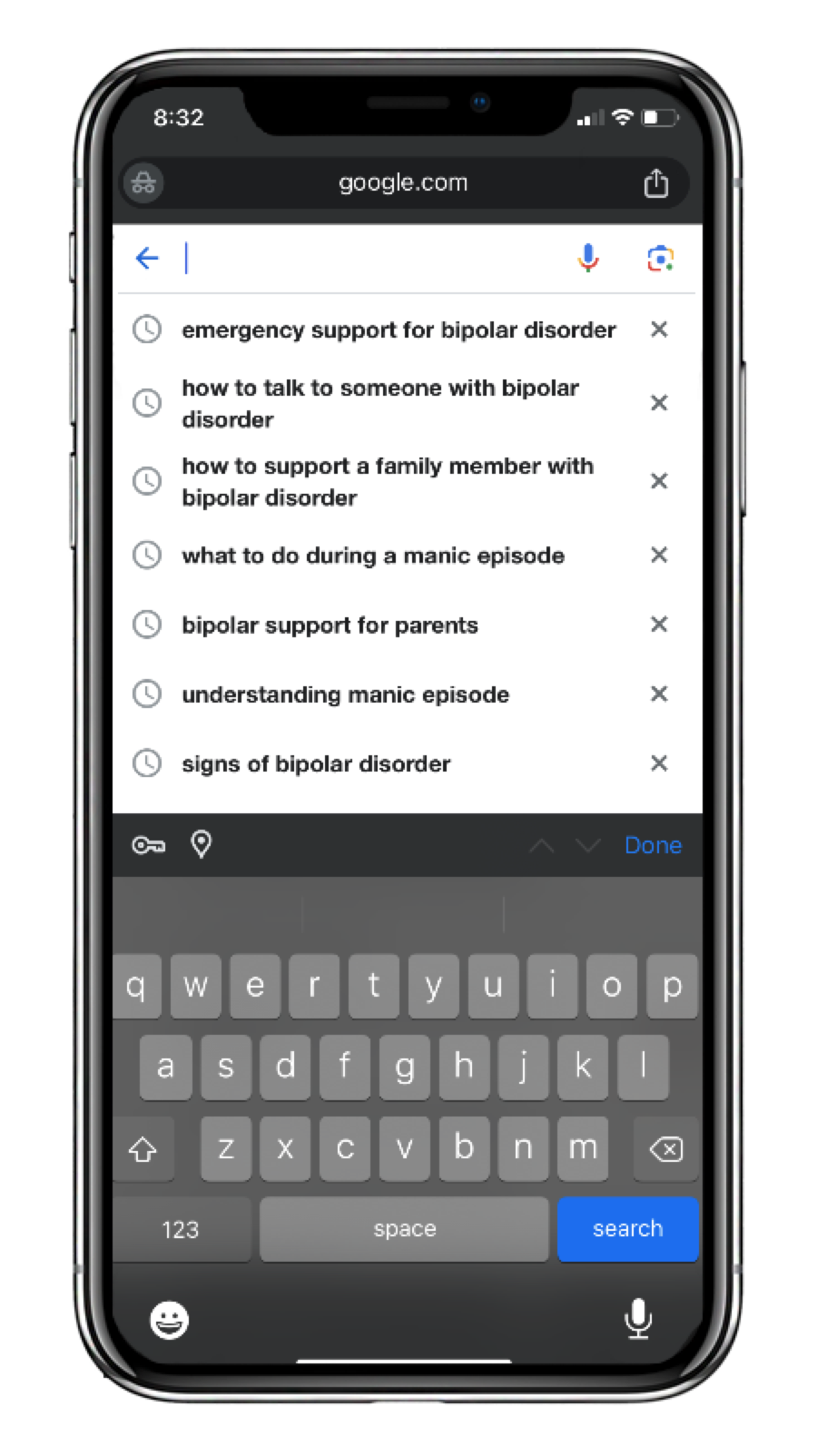Bipolar Disorder Services
Bipolar Disorder Family Support Services
Learn How to Help Your Loved One with Bipolar Disorder
Introduction
Seeing someone you love go through a bipolar episode can be overwhelming and heartbreaking. The unpredictable behaviors, emotional highs and lows, and not knowing how to help can leave you feeling powerless. I know this journey well, both from my professional background and my own personal experience.
I’m here to help your family navigate this difficult time. Together, we can clear away the confusion, build the skills needed to support your loved one with bipolar disorder, and create a path toward stability and hope.
Ideal for:
Parents with a child in a manic, psychotic, or depressed episode, diagnosed or not.
Family members feeling overwhelmed by their loved one's unpredictable behaviors.
Couples where one partner has bipolar disorder.
Siblings wanting help to support their bipolar sibling.
Anyone struggling to find resources or understand how to effectively help.
Someone wanting to learn more about the disorder and what their loved one is going through.

How it Works
Initial Assessment
We start by assessing your loved one’s current state. Are they in a manic episode, a depressive phase, or somewhere in between? Understanding where they are helps us determine the best way forward. During this assessment, I work closely with you to gather information about their behaviors, mood patterns, and recent events that may have triggered the episode. This thorough understanding is crucial for forming a complete picture of the situation and tailoring my approach to meet your family’s unique needs.
Education and Guidance
I'll provide you with the knowledge and skills to better understand bipolar disorder, its symptoms, and the impact it has on your loved one. Together, we’ll explore practical steps you can take to offer meaningful support during challenging times. We’ll cover topics such as mania, hypomania, depression, and the role of triggers like stress, sleep disturbances, substance use, and more. This understanding will empower you to create an environment that promotes stability.
Intervention and Ongoing Support
You'll learn when to intervene to get your loved one the help they need, and how to do so effectively. We’ll work on recognizing early warning signs of an impending episode so that you can respond proactively. This support also includes building communication skills, setting healthy boundaries, and encouraging positive behaviors. When the time is right, I can work directly with your loved one to help support their recovery journey.
Contact for More Information
BENEFITS
Short Term Benefits
- Gain a clear understanding of bipolar disorder and its symptoms.
- Learn how to support your loved one during an episode.
- Understand when and how to intervene effectively.
- Reduce feelings of helplessness and regain a sense of control.
- Build a sense of unity within the family by learning and working together to support your loved one.
Long Term Benefits
- Prevent future episodes and reduce the impact of the illness on the family.
- Build a foundation for lasting recovery and well-being.
- Strengthen family relationships by fostering a mutual understanding of the illness and its treatments.
- Reduce stigma by fostering an informed perspective.




Personalized Guidance
As someone who has lived with bipolar disorder, I bring both professional knowledge and personal experience. I understand what it’s like to be on the other side of the struggle, and I can share insights that only someone who’s been there can offer. I work collaboratively with each family, honoring your values and pace to ensure our work supports your unique situation.
For example, families often experience frustration when their loved one’s behaviors seem irrational or self-destructive. My role is to help you understand the underlying reasons for these actions—whether it’s mania driving risky behavior or depression leading to withdrawal—and offer real-world solutions that work.
A Real-World Example
Before
A mother struggles to understand why her son is spending all his money, speaking quickly about odd ideas, and becoming aggressive. She feels lost, worried, and unsure of how to help without making things worse.
After
With guidance, she learns how and when to step in effectively. Using strategies we discussed—such as calmly redirecting her son's energy towards constructive activities—she effectively gets him through the manic episode, which eventually led to her son seeing me for psychotherapy. He has been stable for several years now, and both he and his mom are happy with the outcome.
Resources and Tools
Toronto Services
I’m familiar with various mental health services in the city and can guide you to the right resources based on your specific needs. If needed, I can also accompany you to ensure you are adequately supported throughout the process.
Emergency Sessions
If you need urgent support, I will make myself available and prioritize your needs. I understand how critical timely intervention can be, and I will move things around in my schedule to accommodate you as soon as possible.
Take-Home Information
I will send you information packages or videos I’ve created to explain bipolar disorder and guide you in supporting someone through an episode, simplifying complex topics and offering practical support steps.
Frequently Asked Questions
What can I expect during the free consultation?
During the consultation, we’ll have an open, judgment-free conversation. I’ll take the time to understand your situation, answer your immediate questions, and determine if my services are the right fit for your needs.
Can you help my loved one even if they’re not ready for therapy?
Absolutely. I can work with your family to provide the knowledge and skills you need, so that when the time is right, you are fully prepared to guide your loved one toward starting psychotherapy. By building a supportive foundation now, you’ll be ready to help them take that important step when they’re ready.
Is there support for me as a caregiver?
Yes! I offer comprehensive guidance and resources to ensure that you, as a caregiver, are taking care of your own mental health. Supporting someone with bipolar disorder can be emotionally and physically demanding, and I am here to make sure you have the tools, support, and self-care strategies necessary to maintain your own well-being.
What is your rate per session?
My rate is $150 per session. However, I offer a generous sliding scale to make my services accessible and a special discount for students. Feel free to reach out to discuss a rate that works for you.
Do you accept insurance?
I do not bill insurance directly. However, if you live in Ontario and your insurance plan covers Registered Social Workers (RSWs), I will provide you with a receipt to submit for reimbursement.
How do I talk to my loved one about getting professional help?
I will provide you with empathetic and non-confrontational communication strategies that make it easier to approach your loved one about getting professional help. These strategies are designed to create a safe and supportive atmosphere, helping your loved one feel comfortable and open to the idea of seeking support.
Take the First Step:
Schedule Your Free Consultation
Scheduling a consultation is simple. Use the scheduler below to choose a time that works best for you. If you don’t see a time that fits, just send me a message through the contact form. We’ll work together to find a time that works for everyone.

